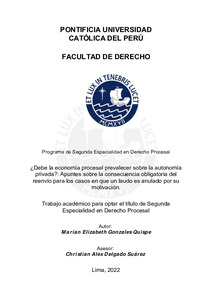¿Debe la economía procesal prevalecer sobre la autonomía privada?: Apuntes sobre la consecuencia obligatoria del reenvío para los casos en que un laudo es anulado por su motivación
Abstract
Si bien la Ley de Arbitraje no prevé una causal expresa, en el Perú es posible
anular un laudo por cuestionamientos a su motivación. Sin embargo, para este
tipo de casos, la Ley de Arbitraje ha regulado como consecuencia el reenvío, y
esta resulta contraproducente en muchas ocasiones por los problemas que
puede generar. Esta consecuencia, además de generar problemas (la
interposición de más de una demanda de anulación respecto de la misma
controversia es uno de ellos), de acuerdo a la regulación actual es, de manera
injustificada, obligatoria, es decir, no admite pacto en contrario, debiendo las
partes conformarse con ver cómo el litigio regresa a las manos del árbitro o los
árbitros que vulneraron su derecho al debido proceso.
En el presente artículo, la autora evalúa si la consecuencia del reenvío debe
admitir un pacto en contrario, ya sea que este pacto entre las partes del arbitraje
se lleve a cabo antes o después de la anulación del laudo. En ese sentido,
presenta de forma crítica los aspectos positivos y negativos de la regulación
actual, para concluir que, en este caso, la autonomía privada debe prevalecer a
la economía procesal; y que por ende, los pactos que dispongan algo distinto a
la consecuencia del reenvío (ya sea el reinicio del arbitraje o reconformación del
tribunal arbitral) deben ser admitidos por el ordenamiento jurídico, debiendo para
ello modificarse la norma contenida en el literal b) del artículo 65.1 de la Ley de
Arbitraje. Although the Arbitration Law does not provide for an express cause of action, in
Peru it is possible to annul an award due to objections to its motivation. However,
for this type of cases, the Arbitration Law has regulated as a consequence the
remand, and this is counterproductive in many occasions due to the problems it
may generate. This consequence, in addition to generating problems (the filing
of more than one annulment claim in respect of the same dispute is one of them),
according to the current regulation is, unjustifiably, mandatory, that is, it does not
admit any agreement to the contrary, and the parties must be satisfied with seeing
how the dispute returns to the hands of the arbitrator or arbitrators who violated
their right to due process.
In this article, the author evaluates whether the consequence of the remand
should admit an agreement to the contrary, whether this agreement between the
parties to the arbitration takes place before or after the annulment of the award.
In this sense, she critically presents the positive and negative aspects of the
current regulation, to conclude that, in this case, private autonomy must prevail
over procedural economy; and that therefore, agreements that provide for
something other than the consequence of the remand (either the restart of the
arbitration or reconformation of the arbitral tribunal) must be admitted by the legal
system, and the rule contained in paragraph b) of Article 65.1 of the Arbitration
Law must be modified for this purpose.
Temas
Arbitraje y laudo--Perú
Motivación
Arbitraje--Legislación--Perú
Motivación
Arbitraje--Legislación--Perú
Para optar el título de
Segunda Especialidad en Derecho Procesal
Collections
The following license files are associated with this item:






